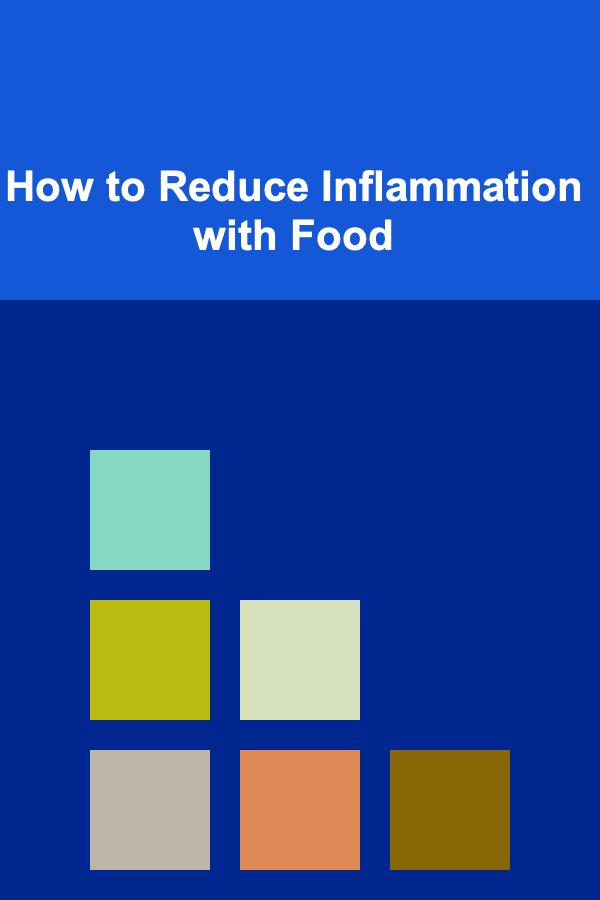
How to Reduce Inflammation with Food
ebook include PDF & Audio bundle (Micro Guide)
$12.99$7.99
Limited Time Offer! Order within the next:

Inflammation is a natural response by the body's immune system to fight off infections, injuries, and other harmful stimuli. However, chronic inflammation can lead to a host of health issues, including heart disease, arthritis, diabetes, and even cancer. In the age of fast food and sedentary lifestyles, chronic inflammation is becoming increasingly prevalent. Fortunately, our diet can play a pivotal role in both causing and mitigating this inflammation. In this article, we will explore how food can reduce inflammation in the body, focusing on anti-inflammatory foods, dietary patterns, and the mechanisms by which they exert their effects.
Understanding Inflammation
Inflammation is a defense mechanism that helps the body heal and protect itself from harm. Acute inflammation is short-lived and usually resolves once the threat is gone. It's typically marked by symptoms like redness, swelling, heat, and pain at the site of injury or infection. For instance, if you get a cut, your body produces inflammation to fight infection and promote healing.
However, when inflammation becomes chronic, it can have detrimental effects on the body. Chronic inflammation is associated with various conditions such as:
- Arthritis: Chronic inflammation of the joints leads to pain, swelling, and stiffness.
- Cardiovascular Disease: Persistent inflammation contributes to the buildup of plaque in the arteries, increasing the risk of heart attacks and strokes.
- Diabetes: Chronic inflammation impairs insulin signaling and leads to insulin resistance, a precursor to type 2 diabetes.
- Cancer: Chronic inflammation can create an environment that supports the development of cancerous cells.
Chronic inflammation is often influenced by lifestyle factors, including poor diet, stress, lack of exercise, and smoking. Fortunately, research has shown that certain foods can help reduce inflammation and lower the risk of these diseases.
The Role of Diet in Inflammation
What we eat can either promote inflammation or help reduce it. An inflammatory diet is typically high in processed foods, refined sugars, and unhealthy fats, while an anti-inflammatory diet consists of whole foods rich in nutrients, fiber, and healthy fats.
The foods we eat influence inflammation through various mechanisms. For example, they can affect the production of pro-inflammatory cytokines ---signaling proteins released by the immune system that promote inflammation. Certain foods also impact oxidative stress, which is a state of imbalance between free radicals (unstable molecules) and antioxidants in the body. Oxidative stress contributes to chronic inflammation.
To reduce inflammation, it's important to focus on foods that lower the production of these inflammatory molecules and support antioxidant defenses.
Anti-Inflammatory Foods
- Fruits and Vegetables
Fruits and vegetables are packed with vitamins, minerals, and antioxidants that combat inflammation. They are rich in fiber, which is essential for gut health---a key player in immune function and inflammation regulation.
Berries
Berries, such as blueberries, strawberries, and raspberries, are particularly potent anti-inflammatory foods. They are high in antioxidants like flavonoids and anthocyanins, which help reduce oxidative stress and the production of pro-inflammatory cytokines. Studies have shown that consuming berries regularly can help lower markers of inflammation in the body.
Leafy Greens
Leafy greens like spinach, kale, and Swiss chard are rich in vitamin K , which has anti-inflammatory properties. These vegetables are also high in fiber, which supports gut health and contributes to a balanced immune response.
Cruciferous Vegetables
Cruciferous vegetables, including broccoli, cauliflower, and Brussels sprouts, contain compounds like sulforaphane and indole-3-carbinol that have been shown to reduce inflammation. These vegetables are also high in fiber, which helps lower systemic inflammation by promoting a healthy gut microbiome.
- Healthy Fats
Not all fats are created equal. While trans fats and saturated fats contribute to inflammation, certain fats are anti-inflammatory and essential for health.
Omega-3 Fatty Acids
Omega-3 fatty acids, found in fatty fish (like salmon, mackerel, and sardines), flaxseeds, chia seeds, and walnuts, are among the most potent anti-inflammatory compounds. Omega-3s reduce the production of inflammatory molecules and help regulate the immune system. Regular consumption of omega-3-rich foods has been linked to reduced inflammation and a lower risk of chronic diseases.
Olive Oil
Extra virgin olive oil is another source of healthy fat that has significant anti-inflammatory properties. It contains oleocanthal , a compound that mimics the effects of nonsteroidal anti-inflammatory drugs (NSAIDs) in the body. Olive oil also contains polyphenols, which are antioxidants that help reduce oxidative stress.
- Nuts and Seeds
Nuts and seeds are nutrient-dense foods that contain healthy fats, fiber, and antioxidants. These foods help reduce inflammation and improve heart health.
Almonds and Walnuts
Almonds and walnuts, in particular, are excellent sources of monounsaturated fats and omega-3 fatty acids. Walnuts, in particular, are rich in ellagic acid, an antioxidant that has been shown to reduce markers of inflammation.
Chia Seeds and Flaxseeds
Both chia seeds and flaxseeds are excellent plant-based sources of omega-3 fatty acids. They are also high in fiber, which promotes gut health and helps reduce systemic inflammation.
- Herbs and Spices
Herbs and spices have long been used for their medicinal properties, many of which include anti-inflammatory effects.
Turmeric
Turmeric contains curcumin , a powerful anti-inflammatory compound that has been studied extensively for its health benefits. Curcumin reduces inflammation by blocking the activity of inflammatory enzymes and signaling pathways. Combining turmeric with black pepper , which contains piperine, can enhance the absorption of curcumin, making it more effective.
Ginger
Ginger is another spice with well-documented anti-inflammatory properties. It contains bioactive compounds like gingerol, which have been shown to reduce inflammation by inhibiting the production of pro-inflammatory cytokines.
- Whole Grains
Unlike refined grains, which can spike blood sugar levels and promote inflammation, whole grains are rich in fiber and antioxidants, making them an excellent choice for reducing inflammation.
Oats
Oats are high in beta-glucan, a type of soluble fiber that helps lower cholesterol and reduce inflammation. Oats also contain antioxidants that combat oxidative stress and improve heart health.
Quinoa and Brown Rice
Quinoa and brown rice are both whole grains that provide a steady source of energy and are rich in vitamins, minerals, and fiber. They are particularly beneficial for people with inflammatory conditions like arthritis, as they help reduce the production of pro-inflammatory molecules.
- Legumes
Legumes, such as beans, lentils, and chickpeas, are excellent sources of plant-based protein, fiber, and antioxidants. They can help reduce inflammation by improving gut health and providing essential nutrients that support the immune system.
Lentils
Lentils are a rich source of polyphenols, which have antioxidant and anti-inflammatory properties. They are also high in fiber, which helps regulate blood sugar levels and reduces systemic inflammation.
Chickpeas
Chickpeas are another legume that provides a wealth of anti-inflammatory nutrients, including vitamin E , selenium , and fiber. These nutrients work together to reduce oxidative stress and promote healthy immune function.
- Fermented Foods
Fermented foods are rich in probiotics, which are beneficial bacteria that support gut health. A healthy gut microbiome plays a crucial role in modulating inflammation, as the gut is intimately connected with the immune system.
Yogurt and Kefir
Fermented dairy products like yogurt and kefir are excellent sources of probiotics, which help balance the gut microbiota and reduce inflammation. Choose plain, unsweetened versions to avoid added sugars.
Sauerkraut and Kimchi
Sauerkraut and kimchi are fermented cabbage dishes that are rich in probiotics and antioxidants. These foods help regulate the immune system and have been shown to reduce inflammation in the body.
- Green Tea
Green tea contains powerful antioxidants called catechins , particularly epigallocatechin gallate (EGCG), which have been shown to reduce inflammation. Drinking green tea regularly can lower the levels of inflammatory markers in the blood and improve overall health.
Foods to Avoid for Inflammation
While certain foods reduce inflammation, others contribute to it. These include:
- Processed Foods: Fast food, chips, and other processed snacks are often high in refined sugars, trans fats, and unhealthy additives that trigger inflammation.
- Refined Sugars: Excess sugar consumption leads to spikes in insulin, which can promote inflammation. Avoid sugary drinks, pastries, and candies.
- Fried Foods: Fried foods are often high in trans fats, which increase inflammation and contribute to the development of chronic diseases.
- Red Meat: While moderate consumption of lean meats like chicken or turkey can be part of a healthy diet, excessive consumption of red meat has been linked to higher levels of inflammation.
- Alcohol: Excessive alcohol intake can increase the production of pro-inflammatory molecules and contribute to liver inflammation.
Conclusion
Reducing inflammation through food is a powerful tool for improving overall health and preventing chronic diseases. By focusing on an anti-inflammatory diet rich in fruits, vegetables, healthy fats, whole grains, legumes, and fermented foods, you can support your immune system, reduce oxidative stress, and mitigate the effects of chronic inflammation. At the same time, it's important to avoid foods that promote inflammation, such as processed foods, refined sugars, and trans fats.
Making small, sustainable changes to your diet can significantly improve your health and well-being, reducing the risk of chronic diseases and improving your quality of life. By nourishing your body with anti-inflammatory foods, you can take control of your health and fight back against the harmful effects of chronic inflammation.
Reading More From Our Other Websites
- [Weaving Tip 101] Sustainable Rug Weaving: Eco‑Friendly Materials and Techniques for Modern Crafters
- [Personal Investment 101] How to Leverage Deep Learning to Create Continuous Passive Income
- [Organization Tip 101] How to Store Pet Supplies in the Kitchen Drawer
- [Home Rental Property 101] How to Prepare Your Home Rental Property for New Tenants
- [Personal Financial Planning 101] How to Maximize Savings with High-Yield Savings Accounts
- [Home Maintenance 101] How to Create a Cleaning Schedule for Your Appliances
- [Home Budget 101] How to Use Budgeting for Home Repairs and Automate to Avoid Major Disasters with Preventative Maintenance
- [Organization Tip 101] How to Maintain a Clutter-Free Living Room
- [Organization Tip 101] How to Plan a Seasonal Garden Layout
- [Soap Making Tip 101] From Beginner to Pro: How a Soap-Making Kit Can Transform Your Craft Skills

How to Incorporate Artisans and Local Makers in Your Home
Read More
How to Light Your Home for Maximum Comfort and Relaxation
Read More
How to Store Your Workout Equipment Without Taking Over Your Space
Read More
How to Transform Your Kitchen for Better Appeal
Read More
10 Tips for Cake Decorating Checklist Success
Read More
10 Tips for Automating Your Emergency Fund Savings
Read MoreOther Products

How to Incorporate Artisans and Local Makers in Your Home
Read More
How to Light Your Home for Maximum Comfort and Relaxation
Read More
How to Store Your Workout Equipment Without Taking Over Your Space
Read More
How to Transform Your Kitchen for Better Appeal
Read More
10 Tips for Cake Decorating Checklist Success
Read More